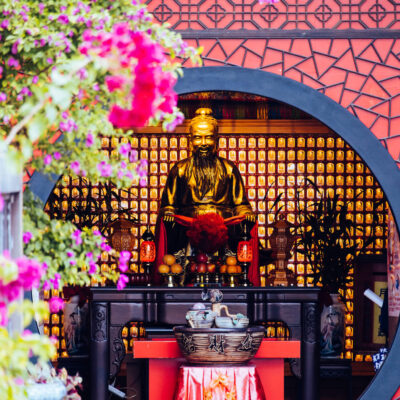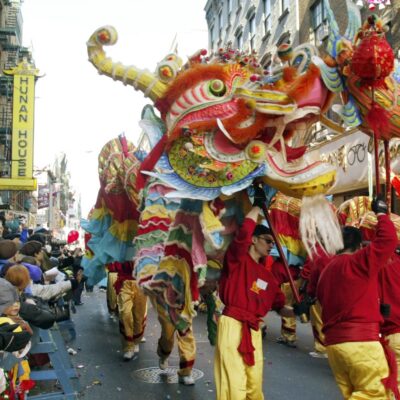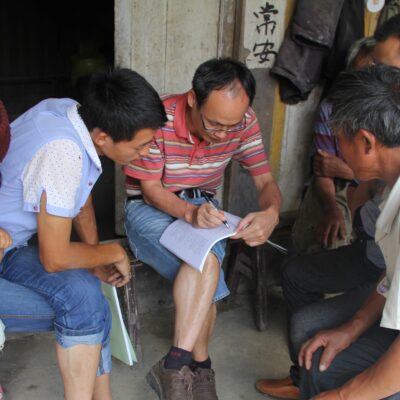Teaching and learning the Chinese language in Australia is usually promoted as useful for economic reasons, that is, students who can speak Chinese would be able to use it for future employment in trade or business.
This utilitarian approach to language learning can constrain students’ understanding of important concepts such as transcultural communication and identity, as well as critical thinking about language and culture. Transcultural understanding can get lost through translation, and misunderstanding can occur when words are uncritically considered to have ‘equivalents’ in other languages.
To illustrate, I will use the Chinese term xiansheng, which is commonly used as the modern Chinese translation of the English terms ‘Mister/Mr.’ and ‘gentlemen’ in the phrase ‘ladies and gentlemen’, but which is sometimes, controversially, used to refer to women.
The current use of xiansheng in Mainland China
In contemporary Chinese dictionaries, xiansheng is listed as being the equivalent of the English term Mister (Mr.) so it’s usually understood as referring to a man, but it is sometimes used as a title for women.
In 2020, Professor Ye Jiaying (Yeh Chia-ying), a renowned female scholar in Chinese classical poetry from Nankai University, China, received a prize from a China Central Television (CCTV) program along with the title of ‘Ye Jiaying xiansheng’. The use of the title xiansheng to honour a woman sparked heated discussions on Weibo, the Chinese counterpart to Twitter, and it was the first time that the use of xiansheng was widely questioned in public.
There was much discussion on Weibo that it’s discriminatory for a woman to be honoured with a male title. Some expressed their discomfort by noting that women were placed as if intrinsically inferior to men when a woman could only be honoured by a title commonly addressing any man. It should be noted that the use of xiansheng in this context was defended by some who argued that in traditional Chinese, xiansheng was an honorific for respected personnel, with no indication of gender. Others argued that since language is always evolving xiansheng should be decoupled from its modern translation as ‘mister/Mr’. For instance, ‘ladies and gentlemen’ (女士们和先生们) is better translated as “nüshimen he nanshimen” (女士们和男士们); or that it’s not discriminatory to use a male term for a woman.
The incident shows the problems that can arise for language learners or translators who are encouraged to rely heavily on modern Standard Chinese dictionaries and textbooks to understand and use translated concepts and terms, without a wider knowledge of the history and context of words.
Modern Chinese textbooks in Mainland China contain only a small proportion of classic Chinese, such as essays and poems. In addition, some of the traditional meanings and use of terms and concepts are lost when the traditional style of written Chinese is replaced by simplified characters. Although the written form of xiansheng remains the same in both traditional Chinese and Standard Chinese, its meanings and usage are discrepant. Therefore, knowledge about how the term and concept has evolved over time is helpful, to have a better understanding of background ideas attached to the term and whether they have been discarded, and to empower language users to be aware of their translingual practice and potential contributions to social change.
Xiansheng and its wide-ranging use
Before xiansheng became a fixed translation of Mister and Mr., it had a very wide range of meanings in the pre-modern Chinese language. According to the Comprehensive Chinese Word Dictionary, xiansheng has been used in a very diverse range of circumstances, including:
- a person born before another,
- one’s older brother from the same father,
- a knowledgeable person who is older than another,
- one’s teacher,
- one’s ancestry,
- a person who retires from their official position,
- a general title for literati and scholar,
- a Taoist priest,
- a fortune teller ,
- a singer in the street, bars or restaurants,
- a doctor,
- a Fengshui practitioner,
- a folk artist of storytelling,
- one’s husband,
- a female sex worker, the usage of which was prevalent in the Shanghai area during the early years of the 1900s.
In the period when xiansheng carried both old and new meanings, it is not easy to distinguish it as purely a courtesy title for men (as gendered) because it was also used as an honorific for a respected person (as gender-neutral) falling into the categories mentioned above. For instance, if Mr. White were a doctor, the Chinese translation would be White xiansheng. In this case, xiansheng plays double roles in referring to White both as a male in gender and a doctor in the profession. The double roles of xiansheng make it more difficult to distinguish the term as gendered or not. In the traditional society where professionals such as doctors were male-dominated, the use of xiansheng could reinforce its connection with the male gender.
In the late 1800s and early 1900s it was not unusual for xiansheng to be used primarily as a title for men—at time when women were largely kept within the household and away from social and political activities.
Research shows the translation of Mister/Mr. was introduced around the time of the anti-imperialist May Fourth Movement in 1919. During and after the May Fourth period, Chinese terms for Mister/Mr. include xiansheng as well as phonemic translations – misituo (密司脫 or 密斯脫, both terms share the same pronunciation but in different characters). If the transliterated terms of Mister/Mr. were widely accepted as a title for men nowadays, it would be possible for xiansheng to retain its gender-neutrality, similar to the usage in Japanese and Korean.
Although it is not clear who first established the linguistic equivalence between Mister/Mr. and xiansheng, and how xiansheng became widely accepted as a title for men, it became a reflective of male-dominant traditional Chinese society. Since ‘mister’ derives from ‘master’, a term initially referring to a man of higher social class, xiansheng, even with no gender distinction per se, became generally used as a title for men only.
Social change: the driving force for language change
Xiansheng has continued to sometimes be used as a title for women. Since the May Fourth Movement and under the influence of feminist movements at the time, nüxiansheng (女先生) referring to female teachers, became a term used in influential newspapers such as Shun Pao. The use of nüxiansheng was applauded at the time as it represented the improved social status of women: obtaining the right to education and to work in professional fields. Thus, female teachers, knowledgeable women, and women who have made substantial contributions to society could receive the honorific title of xiansheng.
Despite this, after the use of tongzhi (同志) as a generic reference for both men and women faded away after the 1980s, xiansheng became most commonly used as a title for a man. The Contemporary Chinese Dictionary (the 5th edition, 2005), one of the most used dictionaries for schooling in mainland China, defines xiansheng as referring to (1) a teacher; (2) a male intellect, or a male adult with a certain social position; and (3) one’s husband—largely gendered terms.
The prevalence of feminist movements in recent years has stimulated, to some extent, the self-recognition and self-identity of individuals, especially women. The change of language, e.g., pre-modern and modern definitions and the current use of xiansheng, has featured in feminist discussion.
The use of xiansheng to refer to women reveals the unconsciousness of gender inequality embedded in the language. If addressing a large audience ‘nüshimen he xianshengmen (ladies and gentlemen, men at the end of both terms implies the plural form of nüshi and xiansheng)’ at a ceremony for instance, and at the same time honouring a woman as xiansheng, this would easily indicate the unequal relations between a nüshi (lady) and a xiansheng (Mister/gentleman). In this scenario, xianshengmen addresses all the men at the ceremony. As a courtesy title to a particular man, ‘xx xiansheng’ is equivalent to ‘Mr. xx’. So, by honouring an honoured woman with the title of ‘xx xiansheng’ is similar to addressing the woman as ‘Mister woman’ or offering a lady the social status of a gentleman. Awareness of this issue is somewhat lacking from the in-depth and systematic research in the Chinese mainland. Despite the situation, decoupling xiansheng from its outdated gender-neutral usage is supported by those who are aware of the issue. Avoiding using xiansheng to address a woman, addressing women by their professions, or simply using nüshi (lady or Ms.) are considered more appropriate in contemporary Chinese settings.
A comparison across borders
The Japanese term sensei (先生) and Korean term seonsaeng (先生), both originated from traditional Chinese and share the same characters as xiansheng. In Japanese, sensei is a generic title for teachers, doctors, lawyers, and other professionals with a certain level of power or authority, which is similar to the usage of xiansheng in traditional Chinese. It is also an honorific for someone who has achieved a certain level of mastery of a certain skill or in the arts, for example, a master chef or a musician. Similarly, the Korean term seonsaeng is a degendered title addressing teachers or an elder. Both sensei and seonsaeng are closer in meaning to the traditional Chinese xiansheng than the modern Standard Chinese term.
Conclusion
The changing use of the term xiansheng illustrates the importance of an inclusive approach to language education and empowering students to critically engage with language and culture. A utilitarian and synchronic approach to language learning can sometimes cause misunderstandings in translingual and transcultural practice. Moreover, language change reflects and creates social change. Learning language through the lens of social change and vice versa helps us better understand the contested ideas underlying the definitions.
Image: Young people in Beijing. Credit: watchsmart/Flickr.




